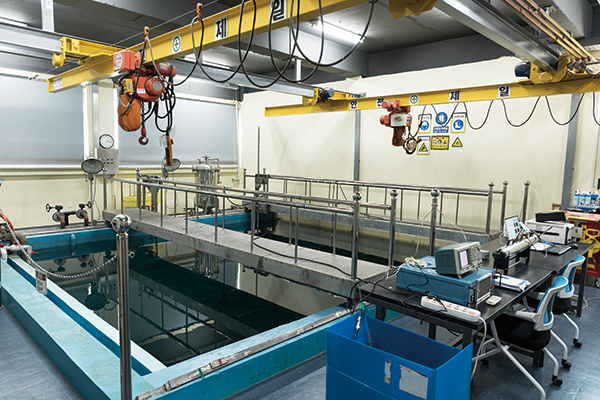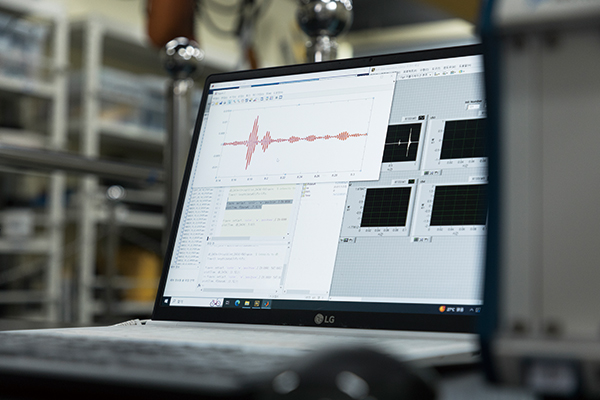

Story
해양 패권 경쟁 시대
스마트 해군 이끌 핵심 인재 육성
Era of Naval Hegemony Competition: Nurturing Talents to Lead the SMART Navy
ERICA캠퍼스 국방정보공학과장 최지웅 교수
Prof. Jee Woong Choi, Dean of the Department of Military Information Engineering at ERICA Campus
- 글 박영임
- 사진 이현구, 국방정보공학과
- Writing Park Yeong-im
- Photograph Lee Hyeon-gu, Department of Military Information Engineering
Scroll Down
Amid the competition among major powers to secure naval hegemony, our Navy builds a maritime power to safeguard our maritime security and national interests. The Department of Military Information Engineering at Hanyang University was established in collaboration with the Navy to nurture talents needed for the Navy’s future. We met with Professor Jee Woong Choi, who concurrently serves as the Dean of the Department of Military Information Engineering and the director of the Hanyang Research Center for Ocean Security Engineering and Technology, to discuss the department’s strengths and the technological competitiveness of maritime weapon systems.
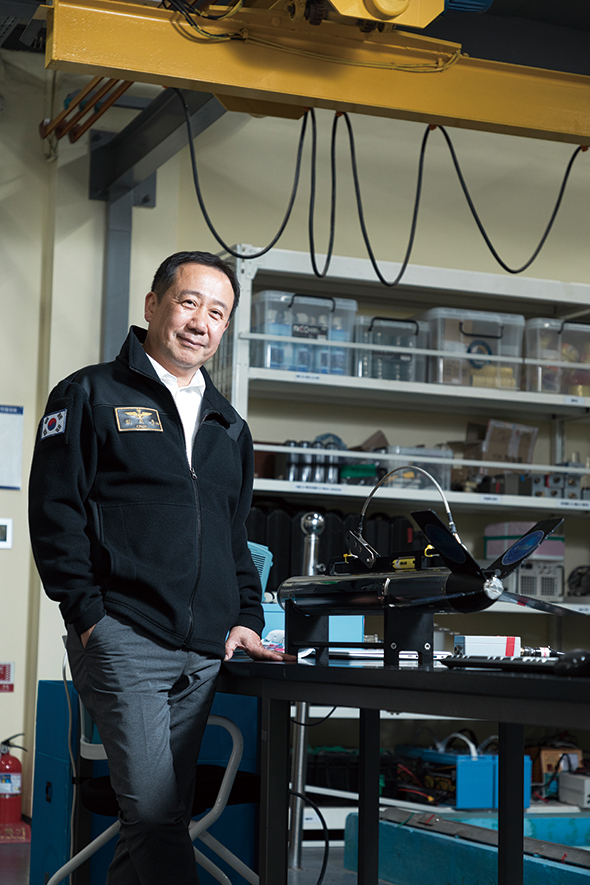
스마트 해군 구현의 중추
“우리나라의 에너지 자원 중 가장 중요한 것은 석유입니다. 그리고 이 석유는 중동에서 소말리아 앞바다를 거쳐 필리핀 해협, 남중국해, 동중국해를 통해 들어오죠. 중국과 러시아의 대양 세력과 미국을 중심으로 일본, 인도, 호주를 잇는 쿼드 체계 해양 세력이 맞서는 핵심 분쟁 지역을 통과해야 합니다. 해양을 지배하는 해군력이 중요한 이유입니다. 국제 정세 속에서 우리나라가 목소리를 내는 방법은 해군력을 키우는 것입니다.”
중국과 미국의 해양 패권을 둘러싼 주도권 싸움이 격화되고 있는 가운데 국방력 중에서도 해군력이 중요하다고 강조하는 최지웅 교수. 특히 해군을 이끌 핵심 인재 양성의 중요성은 두말할 필요가 없다. 해군은 이미 4차 산업혁명 첨단기술을 기반으로 해양 강군인 ‘스마트 네이비(Strong Maritime forces Accomplished with Revolutionary Technology; SMART Navy)’를 구현하겠다고 선포했다. 이에 따라 2015년 한양대 ERICA캠퍼스와 손잡고 국방정보공학과를 설립했으며, 스마트 네이비를 위한 대한민국 최고의 해군 장교를 양성하고 있다.
“국내 최초로 수중음향기술을 연구한 나정열 명예교수님이 한양대에 부임하면서 1986년 해양융합공학과에 국내 최초의 해양음향연구실이 설립됐습니다. 그 후 방산업체 및 해군과 꾸준히 공동연구를 진행해 왔지요. 2000년 초에는 5x5x5m 규모의 수중음향수조실험실을 구축해 현장형 인재 육성을 위한 최상의 여건을 갖췄습니다.”
국방정보공학과는 입학과 동시에 4년 전액 장학금의 혜택을 제공하며, 미래 해군 리더가 갖춰야 할 다양한 자질을 함양하도록 전인 교육을 시행하는 것이 특징이다. 즉 해군 무기체계, 소나시스템 공학, 유도무기 제어 및 성능 해석 같은 공학을 기반으로 한 해군 무기체계의 필수 지식뿐 아니라 강인한 체력과 정신력을 증진할 수 있는 체력 단련, 국제 스포츠, 그리고 경영, 기상 등 인문학 및 기초과학적 소양을 두루 배양할 수 있다. 또한 실전에 필요한 현장 중심의 교육도 실시한다. 1·2학년은 장교직무체험교육을, 3·4학년은 실제 해군 군함에 승선하는 연안 항해 실습부터 세계 일주 순항 훈련까지 다양한 해군 주관 훈련에 참가할 수 있다.
Key to achieving the SMART Navy
“In South Korea, the most crucial energy resource required is oil, and oil comes from the Middle East via the Somali Basin, the Philippine Sea, the South China Sea, and the East China Sea. It must pass through major conflict zones where oceanic powers like China and Russia contend with the Quad framework of the United States, Japan, India, and Australia, underscoring the importance of naval dominance. For South Korea to assert itself in international politics, it must enhance its naval power.”
As tensions escalate over naval hegemony between China and the United States, Professor Jee Woong Choi emphasizes the importance of naval power in our national defense capabilities. Nurturing leaders to steer the Navy is particularly important. The Navy has already declared its intention to implement the ‘SMART Navy (Strong Maritime forces Accomplished with Revolutionary Technology),’ a maritime powerhouse based on advanced technologies of the Fourth Industrial Revolution. In line with this goal, the Department of Military Information Engineering was established in 2015 through the collaboration of the Navy and the Hanyang University ERICA Campus to produce top-notch naval officers for the SMART Navy.
“The first underwater acoustics laboratory in Korea was established in the Department of Marine Science and Convergence Engineering in 1986, when Professor Jungyul Na, a pioneer in underwater acoustics, joined Hanyang University. Since then, we have steadily conducted collaborative research with defense companies and the Navy. By the early 2000s, we had constructed a 5x5x5 m underwater acoustic tank for optimal conditions in nurturing practical talent.”
The Department of Military Information Engineering offers full scholarships for all four years upon admission, focusing on comprehensive education to cultivate various qualities required for future naval leaders. This comprehensive education program includes essential knowledge in naval weapon systems based on engineering, such as sonar system engineering; guided missile control and performance analysis; physical and mental training, such as international sports to enhance resilience; and humanities and basic sciences, such as management and meteorology. Field education necessary for real-world experiences is also provided. Students engage in officer duties experiential education in their first and second years, followed by various types of naval training—from coastal navigation practices aboard actual Navy vessels to global circumnavigation training during their third and fourth years.
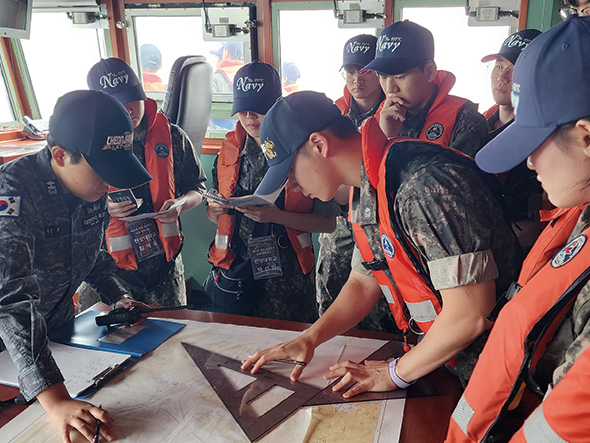
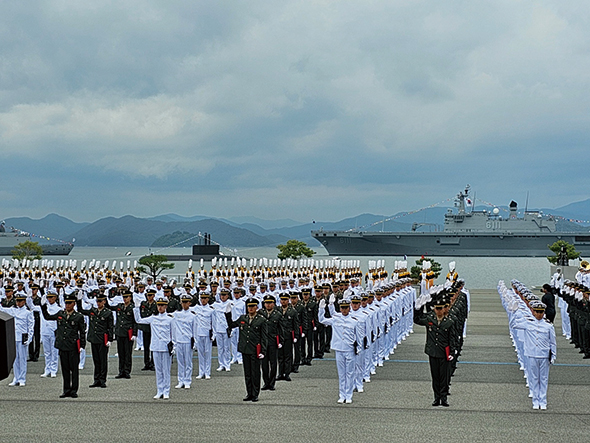
수중 통신·탐지 분야 연구 선도
졸업 후에는 소정의 군사훈련을 이수한 후 자랑스러운 대한민국 해군 소위로 임관해 해군 장교로 주어진 임무를 수행하게 된다. 해군 장교 병과에는 함정, 항공, 정보, 정보통신, 병기 등이 있어 본인의 특기와 적성에 맞는 병과를 선택해 복무하게 된다.
“2019년 1기 졸업생부터 현재까지 122명이 임관했습니다. 지난 5월 31일에 진행된 해군 학사장교 임관식에서는 소위로 임관한 신임 장교 313명 중에서 올 2월에 졸업한 천경민 소위(20학번)가 영예의 국방장관상(수석)을 수상했습니다.”
수석 임관의 영광은 이번이 처음은 아니다. 2019년에 배출한 1기 졸업생부터 기수마다 수석이나 차석을 꿰차며 한양대 국방정보공학과의 위상을 높였다. 임관 후 7년간 해군 장교로 근무한 후에는 계속 직업 군인으로 복무하거나 대위로 예편할 수 있다. 예편을 결정한 경우 그동안 축적한 전문지식과 노하우를 바탕으로 국방과학연구소, 한국해양과학기술원 등 국책연구소나 방위산업체로 진로 확장이 가능하다.
“한양대는 미래해양연구센터를 운영하며 해양 무기체계 및 수중 통신·탐지 분야 연구를 선도하고 있습니다. 수중에서 적군의 수상함, 잠수함을 찾아내려면 수중 통신·탐지 기술을 활용해야 하므로 음파 전달 특성 및 신호처리 연구를 진행하고 있죠. 아울러 해군에서 현재 운용 중이거나 향후 개발될 무기체계에 대한 수중 통신 성능, 표적 탐지 성능 예측 연구를 수행하고 있습니다.”
이러한 예측 결과들을 바탕으로 통신 성능과 탐지 성능을 최대화하기 위한 소나의 최적 배치 연구 및 표적 추적 연구도 추진 중이다. 최근 미국이나 중국은 하나의 소나 플랫폼이 아닌, 다수의 소나 플랫폼들에서 수집된 정보를 융합해 수중 통신 및 탐지·추적 성능을 향상시키고 있다. 한양대 또한 국방과학연구소, 국방기술진흥연구소, LIG넥스원 등과 함께 이러한 최신 분야 연구들을 수행하며 지속적으로 기술 경쟁력을 높이고 있다.
Leading research in underwater communication and detection
Upon graduation and completing military training, graduates are commissioned as proud Republic of Korea Navy (ROKN) officers to fulfill their assigned duties as naval officers. The Navy officer branches include submarines, aviation, information, communications, and weaponry, allowing individuals to choose a branch that aligns with their skills and aptitudes.
“Since the first graduating class in 2019, 122 officers have been commissioned. At the Navy Officer Commissioning Ceremony held on May 31, among the 313 newly commissioned officers, Ensign Cheon Kyung-min (Class of 2020) had the glory of winning the Minister of National Defense Award (First Place).”
This achievement is not unprecedented. Starting from the first class in 2019, every class has produced first-place or second-place graduates, enhancing the status of Hanyang University’s Department of Military Information Engineering. After seven years of service as naval officers, graduates can continue their careers as professional soldiers or opt for promotion to Lieutenant. Those choosing the latter can expand their careers into national research institutes or defense industries, such as the Agency for Defense Development and the Korea Institute of Ocean Science & Technology, or defense industries, based on their accumulated expertise and knowledge.
“Hanyang University operates the Hanyang Research Center for Ocean Security Engineering and Technology, leading research in maritime weapon systems and underwater communication and detection. Research focuses on sound-wave transmission characteristics and signal processing to detect enemy surface vessels and submarines using underwater communication and detection technologies. Additionally, we are conducting research on prediction of underwater communication performance and target-detection performance for current and future naval weapon systems.”
Based on these prediction results, ongoing research includes optimizing sonar deployment to maximize communication and detection performance and researching target tracking using acoustics. Recently, countries like the United States and China have integrated multiple sonar platforms to enhance underwater communication, detection, and tracking performance. In collaboration with the Agency for Defense Development, Korea Research Institute for Defense Technology Planning and Advancement, LIG Nex1, etc., Hanyang University continues to conduct cutting-edge research in these fields to enhance its technological competitiveness consistently.
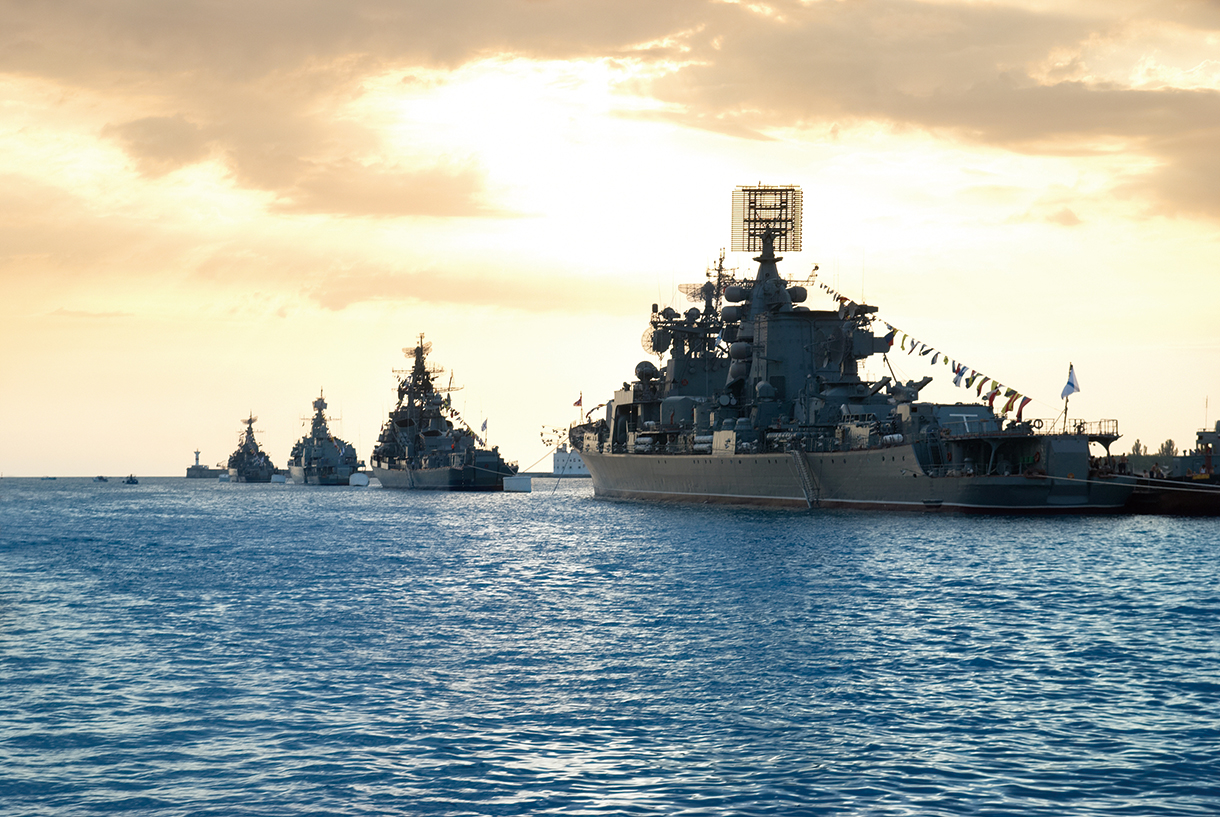
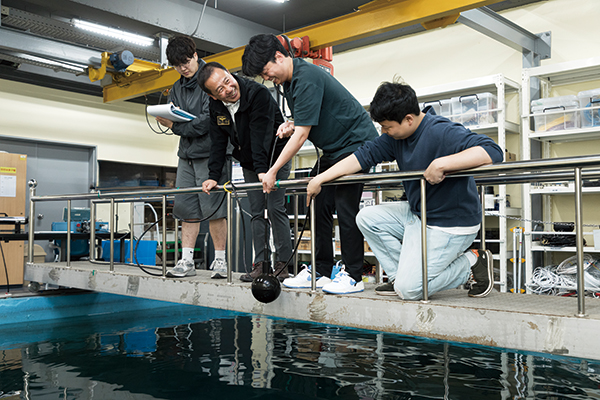
한양대는 국내 최고 해양음향연구실인 미래해양연구센터, 해군 계약학과인 국방정보공학과를 통해 해양 무기체계 및 수중 통신·탐지를 비롯, 방산 분야 연구와 인재 양성을 선도하고 있다
Hanyang University is at the forefront of defense industry research and talent development, specializing in maritime weapon systems and underwater communication and detection. This leadership is achieved through the Hanyang Research Center for Ocean Security Engineering and Technology, the nation’s premier maritime acoustics laboratory, and the Department of Military Information Engineering, a dedicated Navy contract program.
서울-ERICA 국방연구원 설립 계획
“러시아-우크라이나 전쟁 등 현대전을 분석하면 무기체계의 인공지능화, 무인화가 급격히 이뤄지면서 과거의 전쟁과는 다른 양상을 보이고 있습니다. 이러한 시대 변화에 발맞춰 주요 선진국들을 중심으로 유·무인 복합 체계를 구축하려는 경쟁이 가속화되고 있습니다. 우리 해군이 미래 해양 강군으로 도약하기 위해서는 최신 무기체계의 도입과 더불어 변화를 주도할 지능정보융합형 인재를 육성해야 합니다. 대학은 지능정보형 인재 육성의 요람으로써 최선두에서 그 역할을 담당해야 한다고 생각합니다.”
한양대는 첨단산업, 지역산업, 대학 중장기 발전과 연계해 △로봇 △바이오 △부품소재/반도체 △스마트시티 △환경 △에너지 △국방의 7대 특성화 분야를 선정했다. 이 가운데 국방, 반도체, 바이오를 우선 특화 분야로 정하고 첨단융합대학을 신설했으며, 2025학년도부터 신입생 모집에 나설 계획이다. 첨단융합대학은 국방지능정보융합학부, 바이오신약융합학부, 차세대반도체융합공학부의 3개 학부로 나뉘는데 이 중 국방지능정보융합학부는 일반학부인 지능정보양자공학전공과 해군 계약학과인 국방전략기술공학과(현 국방정보공학과)로 구성된다.
한편, 한양대 ERICA캠퍼스는 2년 전부터 대학원 과정으로 국내 주요 방위산업체인 LIG넥스원의 계약학과인 지능정보융합공학과를 운영하고 있다. 이 학과에 재학 중인 석사과정 학생들은 졸업과 동시에 LIG넥스원의 연구원으로 취직해 첨단 방위산업을 이끌어나가는 K-방산의 핵심 인재로 활약하게 된다. 한양대는 앞으로 해군, 해병대와 협력해 한양대 해양융합연구센터를 설립하고 국방 분야 경기도지역협력연구센터(GRRC)도 유치할 방침이다. 또 한양대 양 캠퍼스가 협력하는 서울-ERICA 국방연구원 구축도 계획 중이다.
“전자공학이나 기계공학, 컴퓨터공학, 소프트웨어공학, 산업공학 등 일반 학과에서 공부하는 학생 중에서도 K-방산에 관심을 둔 학생들이 많을 것으로 생각합니다. 한양대에는 LIG넥스원 계약학과가 있을 뿐 아니라, 다양한 분야에서 방위산업과 관련해 좋은 연구 실적을 거두는 교수님들이 많이 계십니다. 여러분의 잠재력을 믿고 해당 교수님들의 연구실 문을 두드려 추후 K-방산을 이끌 핵심 인재로 성장하기를 바랍니다.”
Plan to establish the Seoul-ERICA Defense Research Institute
“Analyzing modern warfare, such as the Russia-Ukraine war, reveals a stark contrast to historical warfare due to the rapid AI integration and unmanning of weapon systems. In response to these changes, competition among major advanced nations to establish integrated manned and unmanned systems is accelerating. For our Navy to emerge as a future maritime powerhouse, we must adopt cutting-edge weapon systems and cultivate intelligent-information-convergence talents capable of spearheading change. I believe universities should play a leading role as cradles for fostering intelligence-information-convergence talents.”
Hanyang University has selected seven specialized fields for long-term development in coordination with advanced industries, regional industries, and long-term university development: △robotics, △biotechnology, △components/semiconductors, △smart cities, △environment, △energy, and △defense. Prioritizing defense, semiconductors, and biotechnology, the Advanced Convergence College has been established and will recruit first-year students starting in 2025. The Advanced Convergence College has three departments: National Defense Intelligence Information Convergence Engineering, Bio-Pharmaceutical Convergence, and Next-Generation Semiconductor Convergence Engineering. The Department of National Defense Intelligence Information Convergence Engineering consists of intelligence information quantum engineering in the general department and national defense technology engineering (currently military information engineering) in the Navy contracts department.
Meanwhile, starting two years ago, Hanyang University ERICA Campus began operating the Intelligence Information Convergence Engineering Department—a graduate program in collaboration with LIG Nex1, a leading defense industry in Korea. Students in this program, upon graduation, are employed as researchers at LIG Nex1, actively contributing to the advanced defense industry and becoming leaders of K-Defense.
Hanyang University plans to establish the Hanyang Marine Convergence Research Center in cooperation with the Navy and Marine Corps and attract the Gyeonggi-do Regional Research Center (GRRC) in defense. Additionally, plans are underway to establish the Seoul-ERICA Defense Research Institute, with both campuses collaborating.
“There may be many students studying general engineering disciplines such as electronics, mechanical, computer, software, and industrial engineering who are interested in K-Defense. Aside from the LIG Nex1 contract department, Hanyang University also boasts numerous professors who have achieved significant research results in various fields related to the defense industry. I encourage you to believe in your potential, knock on the doors of their research labs, and grow into key talents who will lead K-Defense in the future.”
